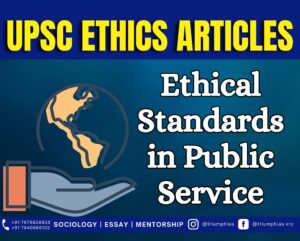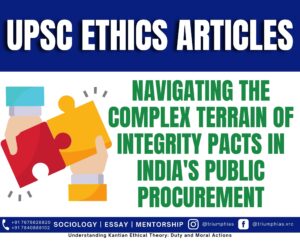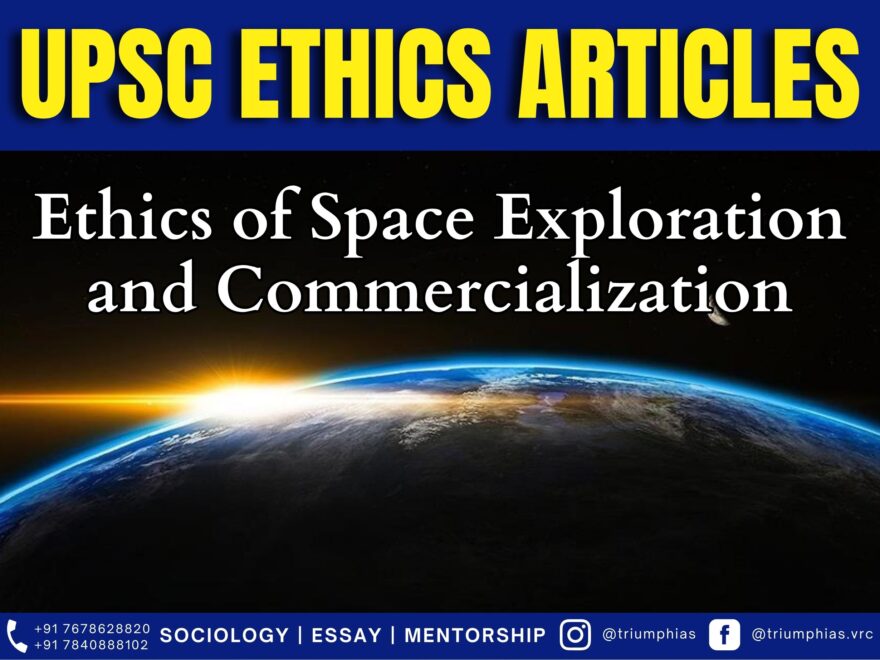Ethics of space exploration and commercialization
[Relevant for Public Ethics, Integrity and Aptitude]
Ethics of Space exploration and commercialization
Space exploration and commercialization have undergone rapid advancements in recent years, giving rise to numerous ethical quandaries. These dilemmas stem from the potential repercussions of human activities in space on celestial bodies and potential extraterrestrial life.
Various ethical dilemmas are associated with space exploration.Ethical dilemans
Example – A civil servant is approached by an elderly individual who qualifies under the public distribution system but lacks the necessary documents. This is a situation that places the civil servant in an ethical dilemma. Ethical dilemmas can be classified into three groups.
|
Certain ethical dilemmas linked with space exploration and commercialization include:
- Preservation vs. Utilization: Striking a balance between preserving the distinctive environmental and cultural heritage of celestial bodies and utilizing them for scientific and economic purposes. Some scientists argue for the preservation of the Moon’s unique geological and cultural heritage.
- Equity vs. Exploitation: Finding a middle ground between ensuring fair access to space resources for current and future generations and preventing their exploitation by powerful entities. Critics question the fairness and sustainability of the commercial exploitation of space resources, such as water and minerals, by private companies or affluent nations.
- Cooperation vs. Conflict: Managing the tension between international cooperation in space activities and the potential for conflicts, weaponization, or security threats in outer space. Some analysts caution against the risks of weaponization, militarization, or terrorism in space, which could undermine existing legal and political frameworks for space governance.
To address these ethical dilemmas, governments and international organizations can promote responsible space activities by:
- Establishing and implementing clear and coherent ethical principles, standards, and guidelines for the exploration and commercialization of space, grounded in values such as human dignity, justice, solidarity, sustainability, and stewardship. These principles should mirror the shared interests and responsibilities of the global community, while also addressing the distinct needs and aspirations of various stakeholders, both on Earth and in space.
- Strengthening and enforcing the existing legal and institutional frameworks governing space activities, including UN treaties and resolutions on outer space, the Committee on the Peaceful Uses of Outer Space, and the International Space Station. These frameworks should guarantee the compliance and responsibility of those involved in space activities, facilitate the prevention and resolution of disputes, and safeguard and advance the rights and interests of all parties.
- Promoting and supporting scientific and public engagement and education concerning space exploration and commercialization, exemplified by initiatives like the World Space Forum, the International Day of Human Space Flight, and the International Asteroid Day. These efforts aim to enhance awareness regarding the advantages and disadvantages of space activities, the ethical and social dilemmas they present, and methods to involve diverse groups in space-related endeavors.
Space exploration and commercialization offer tremendous opportunities for scientific advancement and economic growth but must be conducted with a strong ethical framework to minimize harm and maximize the benefits for all stakeholders, both on Earth and in space.
Frequently Asked Questions:
1. Question: What are the three classifications of ethical dilemmas mentioned in the context of space exploration ethics?
Answer: Private Cost Ethical Dilemmas, Right-versus-Right Ethical Dilemmas, Conjoint Ethical Dilemmas.
2. Question: Name one ethical dilemma associated with space exploration involving the balance between preservation and utilization.
Answer: Preservation vs. Utilization, where the dilemma is about preserving celestial bodies’ environmental and cultural heritage while utilizing them for scientific and economic purposes.
3. Question: What is the potential consequence of conflicts, weaponization, or terrorism in outer space, as mentioned in the article?
Answer: Such actions could undermine existing legal and political frameworks for space governance.
4. Question: How can governments and international organizations promote responsible space activities, according to the article?
Answer: By establishing clear ethical principles and guidelines, strengthening legal frameworks, and promoting scientific and public engagement and education.
5. Question: What values are suggested as the basis for ethical principles in space exploration and commercialization?
Answer: Values such as human dignity, justice, solidarity, sustainability, and stewardship are mentioned as the basis for ethical principles in space activities.
(Reference: Static portion)
Related Blogs …
 |
 |
To master these intricacies and fare well in the Sociology Optional Syllabus, aspiring sociologists might benefit from guidance by the Best Sociology Optional Teacher and participation in the Best Sociology Optional Coaching. These avenues provide comprehensive assistance, ensuring a solid understanding of sociology’s diverse methodologies and techniques.
META TAGS:
Ethics of space exploration, Space exploration ethics, space commercialization, ethical dilemmas, preservation, utilization, equity, exploitation, cooperation, conflict, responsible space activities, legal frameworks, public engagement.

Choose The Best Sociology Optional Teacher for IAS Preparation?
At the beginning of the journey for Civil Services Examination preparation, many students face a pivotal decision – selecting their optional subject. Questions such as “which optional subject is the best?” and “which optional subject is the most scoring?” frequently come to mind. Choosing the right optional subject, like choosing the best sociology optional teacher, is a subjective yet vital step that requires a thoughtful decision based on facts. A misstep in this crucial decision can indeed prove disastrous.
Ever since the exam pattern was revamped in 2013, the UPSC has eliminated the need for a second optional subject. Now, candidates have to choose only one optional subject for the UPSC Mains, which has two papers of 250 marks each. One of the compelling choices for many has been the sociology optional. However, it’s strongly advised to decide on your optional subject for mains well ahead of time to get sufficient time to complete the syllabus. After all, most students score similarly in General Studies Papers; it’s the score in the optional subject & essay that contributes significantly to the final selection.
“A sound strategy does not rely solely on the popular
Opinion of toppers or famous YouTubers cum teachers.”
It requires understanding one’s ability, interest, and the relevance of the subject, not just for the exam but also for life in general. Hence, when selecting the best sociology teacher, one must consider the usefulness of sociology optional coaching in General Studies, Essay, and Personality Test.
The choice of the optional subject should be based on objective criteria, such as the nature, scope, and size of the syllabus, uniformity and stability in the question pattern, relevance of the syllabic content in daily life in society, and the availability of study material and guidance. For example, choosing the best sociology optional coaching can ensure access to top-quality study materials and experienced teachers. Always remember, the approach of the UPSC optional subject differs from your academic studies of subjects. Therefore, before settling for sociology optional, you need to analyze the syllabus, previous years’ pattern, subject requirements (be it ideal, visionary, numerical, conceptual theoretical), and your comfort level with the subject.
This decision marks a critical point in your UPSC – CSE journey, potentially determining your success in a career in IAS/Civil Services. Therefore, it’s crucial to choose wisely, whether it’s the optional subject or the best sociology optional teacher. Always base your decision on accurate facts, and never let your emotional biases guide your choices. After all, the search for the best sociology optional coaching is about finding the perfect fit for your unique academic needs and aspirations.
To master these intricacies and fare well in the Sociology Optional Syllabus, aspiring sociologists might benefit from guidance by the Best Sociology Optional Teacher and participation in the Best Sociology Optional Coaching. These avenues provide comprehensive assistance, ensuring a solid understanding of sociology’s diverse methodologies and techniques. Sociology, Social theory, Best Sociology Optional Teacher, Best Sociology Optional Coaching, Sociology Optional Syllabus.
Best Sociology Optional Teacher, Sociology Syllabus, Sociology Optional, Sociology Optional Coaching, Best Sociology Optional Coaching, Best Sociology Teacher, Sociology Course, Sociology Teacher, Sociology Foundation, Sociology Foundation Course, Sociology Optional UPSC, Sociology for IAS,
Follow us :



Find More Blogs…
| Compare and contrast Karl Marx’s and Max weber’s | Karl Marx- Historical Materialism |
| Position of Women In the Modern Indian Society | Sociology: Social system and pattern variables |




